How Does Dental Implant Works
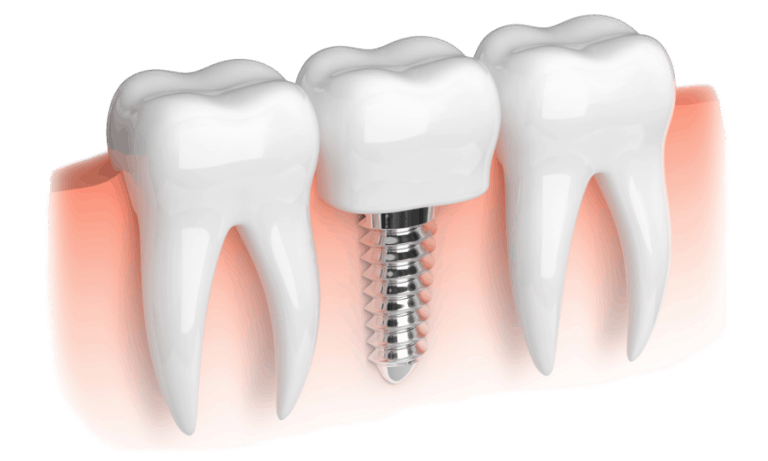
Implants are made from titanium, which is known for its biocompatible properties. It fuses well to your jaw bone, allowing it to provide support for artificial teeth. After being placed inside the jaw bone via a small surgical procedure, the implant is firmly anchored into its surrounding bone tissues over the next few weeks or months (osseointegration), before having a dental crown positioned on the implant.
Dental Implant Structure
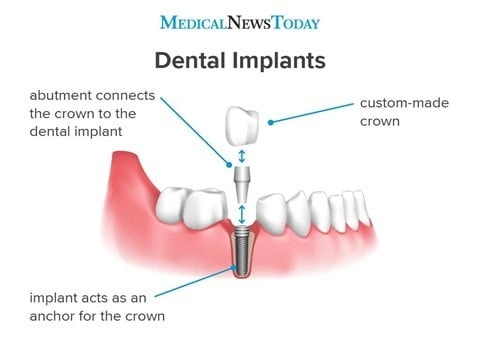
Fixture (Implant)
The implant fixture is shaped like a screw and is composed of either medical-grade titanium or ceramic. This is surgically placed into your jaw bone to replace the root of your natural teeth.
Abutment (Connector)
The implant abutment (connector) is a small nugget that attaches to the implant fixture. It connects the implant fixture to the implant prosthesis.
Prosthesis (Crown)
The implant prosthesis forms the most superficial part of the implant that replaces a lost tooth or lost teeth/tissues.
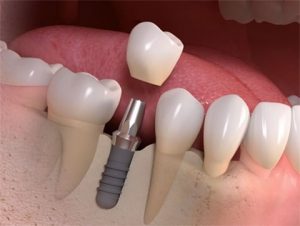

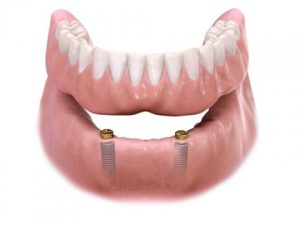
Why dental implants instead of other teeth replacement methods

What to expect for Dental Implant Treatment?
Stage 1
Comprehensive Assessment & Consultation
Our dentists at Allsmiles dental care will perform a thorough evaluation and assessment to determine your suitability for dental implant treatment.
In most cases, anyone healthy enough to undergo a routine dental extraction or oral surgery can be considered for a dental implant. Patients should have healthy gums and enough bone to hold the implant. They also must be committed to good oral hygiene and regular dental visits. Heavy smokers, people suffering from uncontrolled chronic disorders -- such as diabetes or heart disease -- or patients who have had radiation therapy to the head/neck area need to be evaluated on an individual basis.
In some cases, a dental implant may be indicated to replace a recently extracted tooth. Such extraction sites require an average of 3 to 4 months to fully recover and stabilize before any dental implant can be placed.
stage 2
Surgical placement of the implant
For a successful dental implant procedure to be carried out, you need to have sufficient jaw bone since the implant fixture requires a sturdy foundation for support.
If your jawbone isn't thick enough or is too soft, you may need bone grafting before you can have dental implant surgery. That's because the powerful chewing action of your mouth exerts great pressure on your bone, and if it can't support the implant, the surgery likely would fail. A bone graft can create a more solid base for the implant.
There are several bone graft materials that can be used to rebuild a jawbone. Options may include a natural bone graft, such as from another location in your body, or a synthetic bone graft, such as bone-substitute material that can provide support structures for new bone growth. Talk to your doctor about options that will work best for you.
It may take several months for the transplanted bone to grow enough new bone to support a dental implant. In some cases, you may need only minor bone grafting, which can be done at the same time as the implant surgery. The condition of your jawbone determines how you proceed.
Our dentists will thoroughly discuss these with you during the planning stage should any of these be needed.
stage 3
Placement of the new custom made crown
The entire procedure of inserting a successful dental implant and for full recovery to take place can take up to 6 months. The procedure can be summarised into 4 main steps: implant insertion, osseointegration, abutment placement, and prosthesis placement.
The 4 steps of the procedure are not carried out in one dental visit or surgery but over the course of several months. This is to allow for healing and for the implant to fuse properly with its surrounding jaw bone. This is known as Osseointegration (seen here in step 2) and is critical to the success of any dental implant.
After healing is complete, and the integration is successful, the abutment and the prosthesis can be attached to the implant fixture (steps 3 & 4).
stage 4
Routine Follow up and Maintenance
After your dental implant surgery, you may experience some of the typical discomforts associated with any type of dental surgery, such as:
- Swelling of your gums and face
- Bruising of your skin and gums
- Pain at the implant site
- Minor bleeding
You may need pain medications or antibiotics after dental implant surgery. After each stage of surgery, you may need to eat soft foods while the surgical site heals.
Getting Dental Implants
While dental implant technology has progressed by leaps and bounds, it is in fact not suitable for everyone. We seek to provide the most ideal and safest treatment to our patients by conducting a comprehensive examination during your initial visit, to ensure your suitability for the treatment. 3D x-ray imaging is also available when we need to better visualise what we are working with.
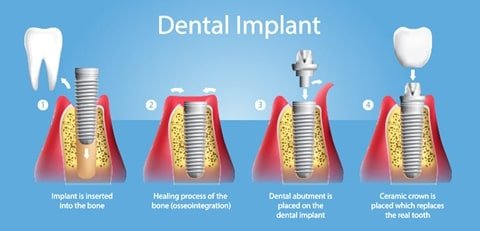
FAQs For Dental Implants
Dental implants are not for everyone. A comprehensive examination with us will be necessary to determine your suitability for this treatment.
In order to ensure that your implant lasts, good oral hygiene is crucial. It is important to make use of interdental tools that allows you to reach and clean areas around your implant that may be difficult to reach.
Single dental implants cost around $3,500 to $5,500 on average in Singapore, depending on the type and design of implant and crown used for the treatment.
Payment can be done progressively from the start to end of the treatment. You may use Medisave to claim and cover part of the cost, while the remaining fee can be paid with cash or cards at your comfort.
At AllSmiles, we believe in only using quality and reliable implant components from reputable companies for our patients. As the treatment for each individual varies, we recommend you to visit us for a professional assessment by our dentists to understand the exact costs and discuss the treatment.
The duration of the treatment for each individual varies. Before the surgery, our dental surgeon will assess the patient to determine their dental condition and discuss the treatment with the patient. The entire whole dental implant will generally take 3 to 6 months to complete.
Like our natural teeth, dental implants need to be cleaned regularly. Besides practising good oral hygiene, the implants must be checked regularly and professionally cleaned by a dentist.
When a tooth is missing, it leaves a gap and causes the surrounding bone tissues to shrink. Dental implants help to fill the gap left by the missing tooth while providing support for the bone tissues. This will also prevent the neighbouring teeth from drifting away from their positions and opposing teeth growing into the gap of the missing tooth.

